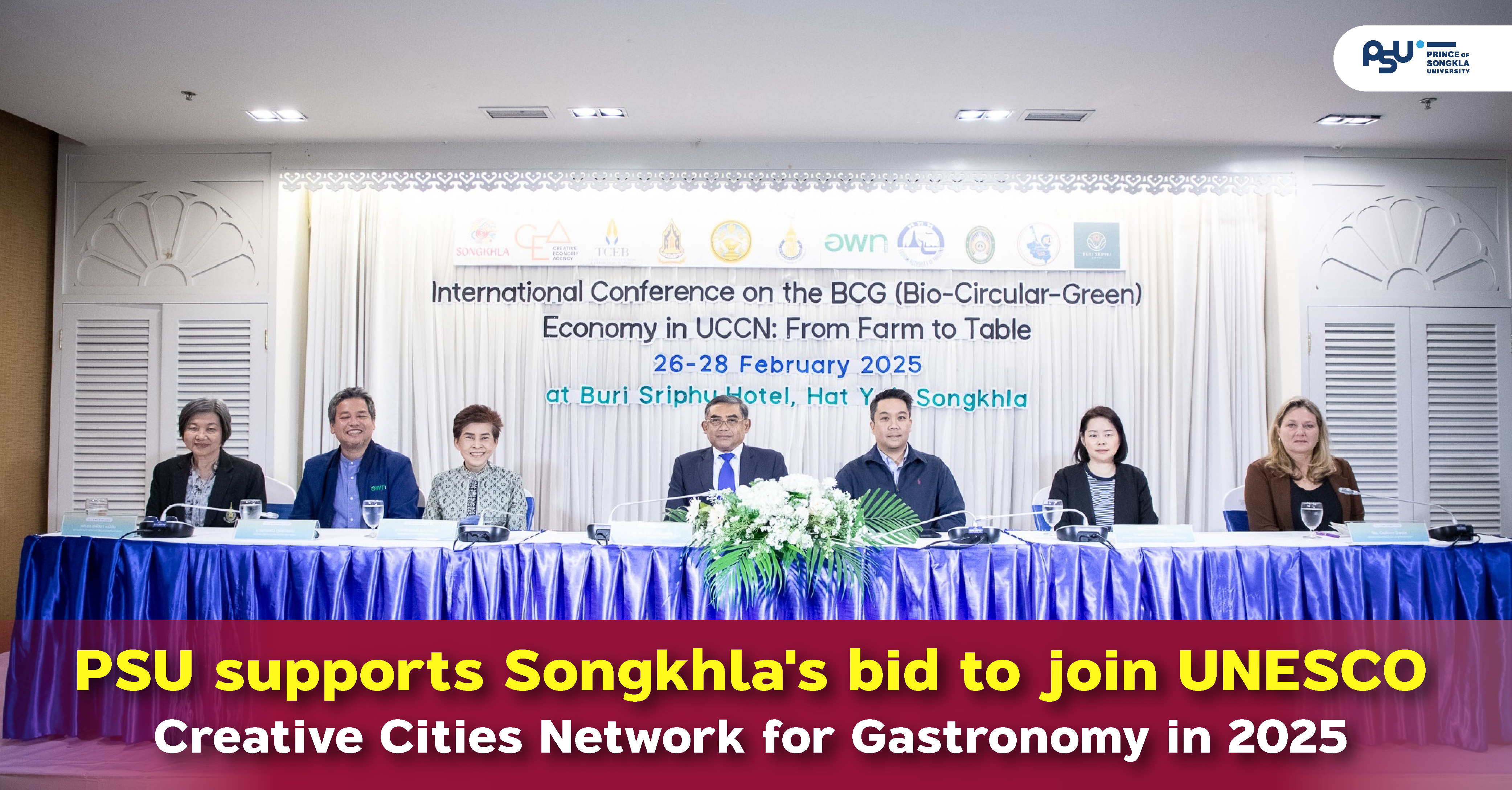
From 26 to 28 February 2025, PSU, in collaboration with Songkhla Province and key national organizations—including the Ministry of Culture, the Thailand Convention and Exhibition Bureau (Public Organization), the Sustainable Tourism Development Public Organization, the Tourism Authority of Thailand, the Creative Economy Promotion Office, and the Songkhla Community Tourism Promotion Association—hosted the International Conference on the BCG (Bio-Circular-Green) Economy in UCCN, along with the From Farm to Table event. These events were held at Buri Sriphu Hotel in Hat Yai, as well as in Songkhla City and Singhanakhon District, aiming to strengthen Songkhla’s bid for membership in the UNESCO Creative Cities Network (UCCN) for Gastronomy.



The event received gracious support from members of the UNESCO Creative Cities Network in Gastronomy, with esteemed representatives from San Antonio, USA; Usuki, Japan; Kuching, Malaysia; Tu, China; and Phetchaburi, Thailand. Additionally, delegates from Suphanburi, a UNESCO Creative City of Music, also took part in the initiative. Leading the project was Asst. Prof. Dr. Supatra Davison, Assistant to the President for ASEAN Affairs and Creative Economy at Prince of Songkla University, whose dedication played a pivotal role in advancing Songkhla’s vision for global recognition in gastronomy.




Asst. Prof. Dr. Niwat Keawpradub, President of Prince of Songkla University, emphasized the university’s strong commitment to supporting Songkhla’s strategic vision of gaining international recognition, particularly through its inclusion in the UNESCO Creative Cities Network. He likened this achievement to placing Songkhla on the world map, with UNESCO serving as a beacon that amplifies the city’s global presence. This prestigious recognition not only opens doors for the advancement of food production, exports, and tourism but also reinforces Thailand’s reputation as the Kitchen of the World on the international stage.




A distinguished panel discussion, “Our City’s Policies and the BCG Model,” brought together representatives from UNESCO Creative Cities in Gastronomy and Music, both from Thailand and abroad, to explore policy frameworks for sustainable urban development. Additionally, an inspiring lecture on “From Waste to Wealth” was presented by Mr. Somkiat Amnuaysuwan, Deputy Manager of the Designated Areas for Sustainable Tourism Administration (DASTA) in the Songkhla Lake Basin, alongside Dr. Nutt Nuntapong from PSU’s Faculty of Natural Resources.


On February 27–28, 2025, the From Farm to Table event offered a dynamic blend of insightful sessions and hands-on learning experiences, showcasing Songkhla’s culinary potential on the global stage. A key highlight was a special lecture on “Songkhla: Towards a Creative City of Gastronomy Initiative” delivered by the Vice Governor of Songkhla, outlining the province’s strategic vision for joining the UNESCO Creative Cities Network. Adding a forward-looking perspective, Mr. Jacques-Chai Chomthongdi, Southeast Asia Director of Tilt Collective, presented an engaging talk on “The Kitchen of the Future,” exploring innovative trends shaping the global food industry. The event also featured an enriching panel discussion on “Creative Cities of Gastronomy and Music,” bringing together Ms. Colleen Swain from San Antonio, USA, representing Gastronomy, alongside representatives from Suphanburi, Thailand, recognized as a UNESCO Creative City of Music. This thought-provoking exchange highlighted the intersection of food and culture in shaping vibrant, sustainable creative cities.


Additionally, participants took part in immersive study visits to the Mamuang Bao (Local Sour Mango) Community Enterprise in Hua Khao, Singhanakhon District, and the Sea Bass Farming Group in Koh Yor, Mueang Songkhla District. A highlight of the event was a live demonstration of the SHINKEI-JIME and IKI-JIME fish preservation techniques by esteemed chefs from Usuki, Japan. This session provided valuable knowledge on traditional Japanese methods of maintaining fish quality and freshness while also emphasizing the importance of geographical indication (GI) food products.




